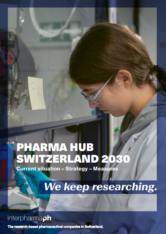26 April 2023
Press Release: EU general pharmaceuticals legislation up for revision – serious consequences expected for Switzerland
As the association of the research-based pharmaceutical industry in Switzerland, Interpharma sees both opportunities and risks in the revision of the EU general pharmaceuticals legislation. Much remains unclear and will require further assessment. The EU strategy focuses on closer collaboration and harmonization in the pharmaceuticals market within the European Union, which could have repercussions for Switzerland as a non-EU country. There is a risk of new obstacles that would delay access to innovative drugs here in Switzerland or hamper the export of medicines from Switzerland.
The EU is advancing a comprehensive strategy with the aims of remaining attractive as a pharmaceutical industry hub, enabling rapid and equitable access to drugs, addressing unmet medical needs and reinforcing the security of its supply. Unfortunately, Switzerland lacks such an overarching strategy with specific measures to support the country’s export engine. That could become a competitive disadvantage for the country. Switzerland is therefore well advised to closely assess the EU revision and to adopt any measures that would also increase the attractiveness of Switzerland as an industry hub. Elements that would adversely impact Switzerland’s innovativeness should absolutely not be adopted; rather, Switzerland should seek to create a competitive advantage in those areas.
Problematic effects on bilateral relations
One major problem is potential effects on bilateral relations. Some parts of the agreement between the Swiss Confederation and the European Union on the mutual recognition of conformity assessments (MRA) in the pharmaceutical sector refer to the existing regulations both in terms of their content and their legal basis. If the revised EU general pharmaceuticals legislation goes into effect, these sections of the MRA must be updated to remain valid from a legal standpoint. But because existing agreements are no longer updated, this could become a serious problem for Switzerland as an industry center.
We also take a critical view of the proposed weakening of intellectual property rights. The development of a drug is a high-risk undertaking, lasting 12 years on average and costing over CHF 2 billion. A lack of strong protections for intellectual property rights reduces the willingness of venture capital investors to invest in research and development, which would be terrible news both for the continent’s standing as a research hub and for patients around the world.
Interpharma closely watching developments
Interpharma will closely monitor and continuously analyze the revision both in its capacity as an active player in the European umbrella organization EPFIA and in terms of its impact on Switzerland. We will do everything in our power, through close collaboration and dialog with all partners, to ensure that the Swiss pharmaceutical industry can retain its international competitiveness.
 read more
read more
 read more
read more
 read more
read more
 read more
read more
 read more
read more








 PDF german
PDF german Go to store
Go to store